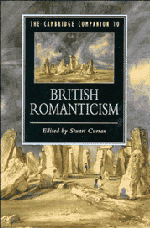Book contents
- Frontmatter
- 1 Romanticism, criticism and theory
- 2 Romanticism and Enlightenment
- 3 Poetry in an age of revolution
- 4 German Romantic Idealism
- 5 Romanticism and language
- 6 Culture's medium
- 7 Romantic Hellenism
- 8 Women readers, women writers
- 9 Romantic fiction
- 10 Romantic poetry
- 11 The sister arts in British Romanticism
- Chronology
- Bibliography
- Index
8 - Women readers, women writers
Published online by Cambridge University Press: 28 May 2006
- Frontmatter
- 1 Romanticism, criticism and theory
- 2 Romanticism and Enlightenment
- 3 Poetry in an age of revolution
- 4 German Romantic Idealism
- 5 Romanticism and language
- 6 Culture's medium
- 7 Romantic Hellenism
- 8 Women readers, women writers
- 9 Romantic fiction
- 10 Romantic poetry
- 11 The sister arts in British Romanticism
- Chronology
- Bibliography
- Index
Summary
“Well, Miss Elliot...we shall never agree I suppose upon this point. No man and woman would, probably. But let me observe that all histories are against you, all stories, prose and verse...I do not think I ever opened a book in my life which had not something to say upon woman's inconstancy. Songs and proverbs, all talk of woman's fickleness. But perhaps you will say, these were all written by men.” “Perhaps I shall. -Yes, yes, if you please, no reference to examples in books. Men have had every advantage of us in telling their own story. Education has been theirs in so much higher a degree; the pen has been in their hands. I will not allow books to prove any thing.”
(Persuasion, chapter 23)Coming very near the end of Austen's last novel (1818), this sharp observation on the gender biases inherent in literary discourse has often been taken as a characteristically oblique expression of her feminism as well as a defense of her singular craft. Notwithstanding the truth that the passage reveals considerable self-reflection, the ironies (the pen is after all in Austen's hand) attending that traditional reading are manifold: it demands that we accept at face value what is, both in the novel and life, knowingly, wittily, undercut.
- Type
- Chapter
- Information
- The Cambridge Companion to British Romanticism , pp. 177 - 195Publisher: Cambridge University PressPrint publication year: 1993
- 10
- Cited by

